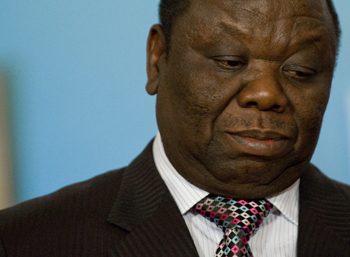How WikiLeaks Just Set Back Democracy in Zimbabwe

Last year, early on Christmas Eve morning, representatives from the U.S., United Kingdom, Netherlands, and the European Union arrived for a meeting with Zimbabwean opposition leader Morgan Tsvangirai. Appointed prime minister earlier that year as part of a power-sharing agreement after the fraud- and violence-ridden 2008 presidential election, Tsvangirai and his political party, Movement for Democratic Change (MDC), are considered Zimbabwe's greatest hopes for unseating the country's long-time de facto dictator Robert Mugabe and bringing democratic reforms to the country.
The topic of the meeting was the sanctions imposed on Zimbabwe by a collection of western countries, including the U.S. and E.U. Tsvangirai told the western officials that, while there had been some progress in the last year, Mugabe and his supporters were dragging their feet on delivering political reforms. To overcome this, he said that the sanctions on Zimbabwe "must be kept in place" to induce Mugabe into giving up some political power. The prime minister openly admitted the incongruity between his private support for the sanctions and his public statements in opposition. If his political adversaries knew Tsvangirai secretly supported the sanctions, deeply unpopular with Zimbabweans, they would have a powerful weapon to attack and discredit the democratic reformer.
Later that day, the U.S. embassy in Zimbabwe dutifully reported the details of the meeting to Washington in a confidential U.S. State Department diplomatic cable. And slightly less than one year later, WikiLeaks released it to the world.
The reaction in Zimbabwe was swift. Zimbabwe's Mugabe-appointed attorney general announced he was investigating the Prime Minister on treason charges based exclusively on the contents of the leaked cable. While it's unlikely Tsvangirai could be convicted on the contents of the cable alone, the political damage has already been done. The cable provides Mugabe the opportunity to portray Tsvangirai as an agent of foreign governments working against the people of Zimbabwe. Furthermore, it could provide Mugabe with the pretense to abandon the coalition government that allowed Tsvangirai to become prime minister in 2009.
It's difficult to see this as anything but a major setback for democracy in Zimbabwe. Even if Tsvangirai is not charged with treason, the opponents to democratic reforms have won a significant victory. First, popular support for Tsvangirai and the MDC will suffer due to Mugabe's inevitable smear campaign, including the attorney general's "investigation." Second, the Prime Minister might be forced to take positions in opposition to the international community to avoid accusation of being a foreign collaborator. Third, Zimbabwe's fragile coalition government could collapse completely. Whatever happens, democratic reforms in Zimbabwe are far less likely now than before the leak.
To their supporters, WikiLeaks and its founder Julian Assange are heroes of the democratic cause. Assange himself has claimed that his organization promotes democracy by strengthening the media. But in Zimbabwe, Assange's pursuit of this noble goal has provided a tyrant with the ammunition to wound, and perhaps kill, any chance for multiparty democracy. Earlier this month, Assange claimed that "not a single person, as far as anyone is aware, has been harmed" by Wikileaks' practices. This is no longer true, if it ever was.
Any damage to democratic reforms from WikiLeaks likely comes not from malice but naivety. Assange is probably not best described, as Vice President Joe Biden recently put it, a "high-tech terrorist." Rather, he, his organization, and their activist supporters believe that they can promote democracy by making an enemy of secrecy itself. What we're seeing in Zimbabwe, however, is that those methods won't necessarily be without significant collateral damage.
Image: Zimbabwean Prime Minister Morgan Tsvangirai. By Saul Loeb/AFP/Getty. Update: On January 11, the Guardian clarified that it, not WikiLeaks, was first to publish the cable, which it had received from WikiLeaks. The Guardian published the Harare cable on December 8, 9:30 p.m. GMT. WikiLeaks, on its website, published the cable the same evening at 9:09 p.m., although WikiLeaks does not note the time zone. WLCentral.org reports that WikiLeaks released the cable as part of a bit torrent file one hour after the Guardian had published. On January 3, the WikiLeaks Twitter account, responding to an op-ed in the Guardian criticizing the Harare cable's release, wrote, "It is not acceptable the Guardian to blame us for a cable the Guardian selected and published on Dec 8." While it's heartening to see WikiLeaks acknowledge that something blameworthy has happened, it's not clear that publishing the cable an hour after the Guardian, as WikiLeaks often does, absolves them of responsibility or will be of much comfort to Morgan Tsvangirai.